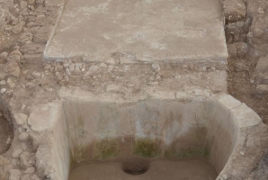
Archaeologists have unearthed new evidence of the extensive overseas trade in wine by the ancient Phoenicians, with the discovery of a 2600-year-old wine press in Lebanon, National Geographic reports.
The find sheds new light on winemaking by the Phoenicians, the seafaring merchants who introduced a culture of drinking wine throughout the ancient Mediterranean, and whose influence lives on in the beverage’s worldwide popularity.
Excavations at Tell el-Burak, about five miles south of the Lebanese coastal city of Sidon, have revealed the well-preserved remains of a wine press used from at least the seventh century B.C. It is the earliest wine press ever found in the Phoenician homelands, which roughly corresponded to modern Lebanon. The discovery is featured in a study published Monday in the journal Antiquity.
Large numbers of seeds show grapes were brought there from nearby vineyards and crushed by treading feet in a large basin of durable plaster that could hold about 1,200 gallons (more than 4500 liters) of raw juice.
The resulting “must” was collected in a large vat and stored in distinctive pottery jars known as amphorae for fermenting, aging, and transport.
Near the village of Areni in Armenia, in the same cave where a stunningly preserved, 5,500-year-old leather moccasin was recently found, archaeologists in 2011 unearthed a 6100-year-old wine press for stomping grapes, fermentation and storage vessels, drinking cups, and withered grape vines, skins, and seeds.

